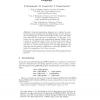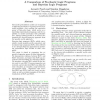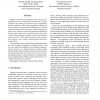3481 search results - page 170 / 697 » Higher-Order Logic Programming as Constraint Logic Programmi... |
LPKR
1997
Springer
15 years 2 months ago
1997
Springer
In this overview we show how Knowledge Representation (KR) can be done with the help of generalized logic programs. We start by introducing the core of PROLOG, which is based on de...
ESOP
2001
Springer
15 years 2 months ago
2001
Springer
Abstract. In logic programming, dynamic scheduling refers to a situation where the selection of the atom in each resolution (computation) step is determined at runtime, as opposed ...
ECSQARU
1997
Springer
15 years 2 months ago
1997
Springer
Abstract. Temporal programming languages are recognized as natural and expressive formalisms for describing dynamic systems. However, most such languages are based on linear ow of ...
ILP
2000
Springer
15 years 1 months ago
2000
Springer
First-order probabilistic models are recognized as efficient frameworks to represent several realworld problems: they combine the expressive power of first-order logic, which serv...
IPPS
2002
IEEE
15 years 3 months ago
2002
IEEE
Tabling or memoing is a technique where one stores intermediate answers to a problem so that they can be reused in further calls. Tabling is of interest to logic programming becau...



